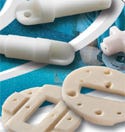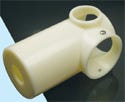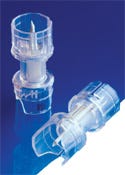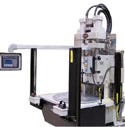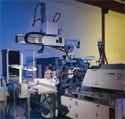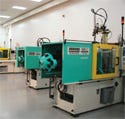Wireless data collected directly from patients during normal physical activities could enable the development of better knee implants
June 16, 2008
Originally Published MPMN June 2008
SPOTLIGHT
Molding
Ceramic injection molding
|
A service provider employs a five-step ceramic injection molding (CIM) process consisting of tool design and manufacturing, mixing, molding, debinding, and sintering, which yields high dimensional accuracy without the need for secondary operations. Suitable for projects where alternative fabrication methods may not be feasible or cost-effective, CIM enables the manufacture of small, intricately shaped components using such materials as aluminum oxide, zirconium oxide, and ZTA ceramic. Able to withstand high temperatures without suffering from thermal shock, these materials offer strength, toughness, wear resistance, and biocompatibility.
Ceradyne Inc., Costa Mesa, CA
www.ceradyne.com
Biomaterials molding
|
A contract molder of implantable-grade biomaterials specializes in working with PEEK-Optima for medical applications designed to come in contact with blood or tissue for more than 30 days. Biocompatibility, stability, strength, and rigidity are among the material’s advantageous properties. The company can process the material using injection molding, extrusion, or compression molding techniques. It can also overmold PEEK with a sealing silicone. Class 10,000 cleanroom capabilities are available to customers in such markets as orthopedics, cardiac rhythm management, and surgical instrumentation.
Molded Rubber & Plastic Corp., Butler, WI
www.mrpcorp.com
Short-run, low-volume molding
|
Specializing in short-run, low-volume molding, a company can provide production runs as low as 50 injection-molded parts. Horizontal injection molding machines are used, as are vertical molding machines for insert molding processes. The company’s equipment is capable of producing parts from both high-temperature and commodity-grade plastics. In addition to molding, the company also offers machining and packaging services, 3-D rapid prototypes, and thermo vacuum forming of trays. It has a Class 100,000 cleanroom and is ISO compliant.
Plastic & Metal Center Inc., Laguna Hills, CA
www.plastic-metal.com
Precision molding services
|
Touting itself as a one-stop shop for plastic parts, a company offers precision molding, in-house mold construction, insert molding, and complex assemblies. Sixteen automated molding machines ranging from 50 to 550 tn can mold materials from engineering-grade to high-performance resins in addition to filled materials and foamed parts. Difficult-to-mold materials, such as PPS, PEEK, Torlon, and Ultem, are a specialty. Moreover, the firm provides assembly, ultrasonic and spin welding, sonic stitching, pad-printing, silk-screen printing, hot-stamping, and heat-sealing services.
Diversified Plastics, Minneapolis
www.divplast.com
Injection molding
|
Conducting all of its injection molding processes under cleanroom conditions, a molder operates a Class 10,000 cleanroom equipped with 60 injection molding machines and 20 injection blow molding machines. Employing electric machinery, the company provides a clean and precise injection molding process that produces components with tight tolerances. Additional molding capabilities include insert, two-material, silicone injection, and overmolding. Accurate documentation and traceability are also provided.
Medisize, Hillegom, Netherlands
www.medisize.com
Insert molding
|
Insert molding can replace such processes as heat-staking and solvent bonding for the manufacture of medical devices, according to a company experienced in the operation. The company’s competencies include design recommendation through mold tooling fabrication, prototyping, full-scale production medical molding, and transfer of a system to a customer’s facility upon request. In addition to offering insert molding services, the firm designs and builds integrated insert molding systems for the manufacture of medical devices. Production cells typically employ vertical molding presses with rotary tables and custom mold tooling, enabling such delicate inserts as cannulae, extrusions, and guidewires to be safely in place for overmolding.
Aberdeen Technologies Inc., Carol Stream, IL
www.aberdeentech.com
PEEK injection molding
|
A full-service contract manufacturer has honed its capabilities to offer injection molding using medical-grade PEEK. The material can be difficult to mold since it requires high temperatures and specialized equipment. However, the service provider has undergone on-site training with the material manufacturer, acquired specialized equipment, and hired experienced toolmakers in order to serve this niche market. The firm operates a 50,000-
sq ft facility equipped with a Class 100,000 cleanroom.
PEDI—Plastics Engineering and Development Inc., Carlsbad, CA
www.pediplastics.com
Silicone injection molding
|
A designer, developer, and manufacturer of medical device components and subassemblies offers injection molding of medical-grade silicones in a Class 100,000, ISO 13485–certified facility. The facility also houses Arburg injection molding machines, advanced material-handling equipment, and automation and cold-runner technology. Applications for its injection molding services include such thermoplastic and silicone parts as injection sites, membrane products, and gaskets. The company specializes in mid- to high-volume thermoplastic manufacturing capabilities.
APEC, a div. of Helix Medical LLC, Baldwin Park, CA
www.apecplastics.com
Copyright ©2008 Medical Product Manufacturing News
You May Also Like
